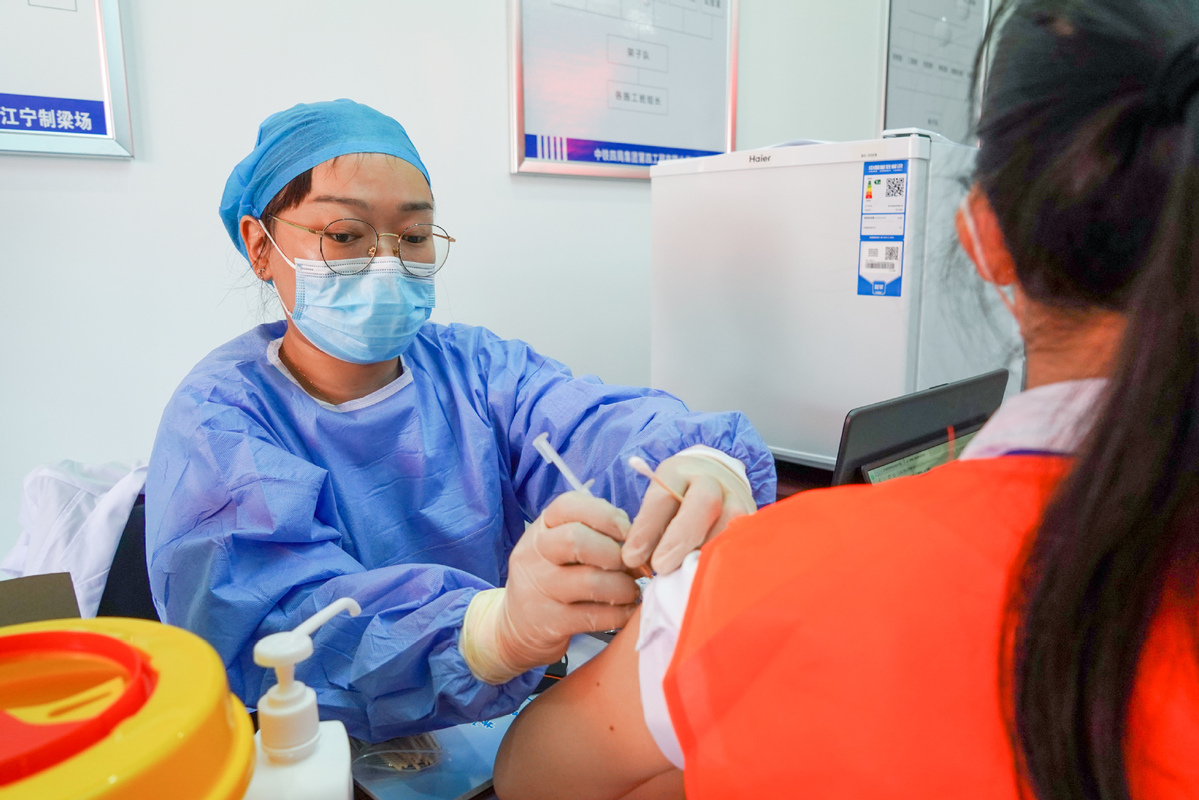Vaccines seen as key to tackling variants
China's COVID-19 vaccine development is among global front-runners, with seven vaccines that have received conditional market approval or been authorized for emergency use, Gao Fu, head of the Chinese Center for Disease Control and Prevention, said on Tuesday.
China's COVID-19 vaccine development is among global front-runners, with seven vaccines that have received conditional market approval or been authorized for emergency use, Gao Fu, head of the Chinese Center for Disease Control and Prevention, said on Tuesday.

A worker takes a jab of COVID-19 vaccine in Nanjing, East China's Jiangsu province on June 8, 2021. [Photo/Xinhua]
These vaccines included five inactivated vaccines, an adenovirus vector vaccine and a recombinant protein subunit vaccine. So far, three inactivated vaccines and the viral-vector vaccine have received market approval, while the others are granted emergency use, he said during the 23rd Annual Meeting of the China Association for Science and Technology.
"China's recent rise in vaccine development capability is thanks to sustained support in basic sciences, including pathogenic biology and immunology," Gao said, adding that the swift decoding of the virus' genetic sequence, comprehensive planning and effective resource allocation also accelerated the development process.
As of June 30, more than 560 million Chinese had received both doses of a two-shot COVID-19 vaccine, meaning 40 percent of China's population had been fully vaccinated against the disease, he said.
"Now we have started our mass inoculation program for the latter half of the year," Gao said. As of July 22, more than 1.5 billion doses of COVID-19 vaccines had been administered in China, according to the National Health Commission.
"To tackle new variants of the coronavirus, sharing COVID-19 vaccines should be a part of the solution so that all countries can have access to them and inoculate their populations, allowing us to stem the global transmission of the disease," he said. "If the world doesn't share its vaccines, then the virus will share the world."
As of July 9, China had supplied 500 million doses of COVID-19 vaccines and concentrates to more than 100 countries and international organizations, accounting for one-sixth of the global vaccine output, according to the Foreign Ministry.
Collaboration needed
Apart from vaccine rollout, Gao said investigating the origin of SARS-CoV-2, the coronavirus that causes COVID-19, also requires international collaboration because it is an extremely important scientific question that will help humanity prepare for future coronavirus-related diseases.
"A major characteristic of coronaviruses is that they are very good at recombination, which allows two closely related viruses to mix and match their genomes and create a new one," he said, adding that scientists have discovered seven coronaviruses capable of infecting humans since 1965.
A key moment in the study of human coronavirus occurred in 2004, when scientists from Hong Kong reportedly found a new virus called HCoV-HKU1. However, Brazilian experts later discovered that samples they collected in 1995, which were in their lab's freezer for years, also had traces of HCoV-HKU1, meaning that this virus has been covertly circulating in the world for years.
"Given how human coronaviruses are so adept at infecting humans, we expect there will be more in the future that can cause an outbreak," he said. "It is all the more reason why people should not cast blame on others and politicize the investigation of the virus' origin."

